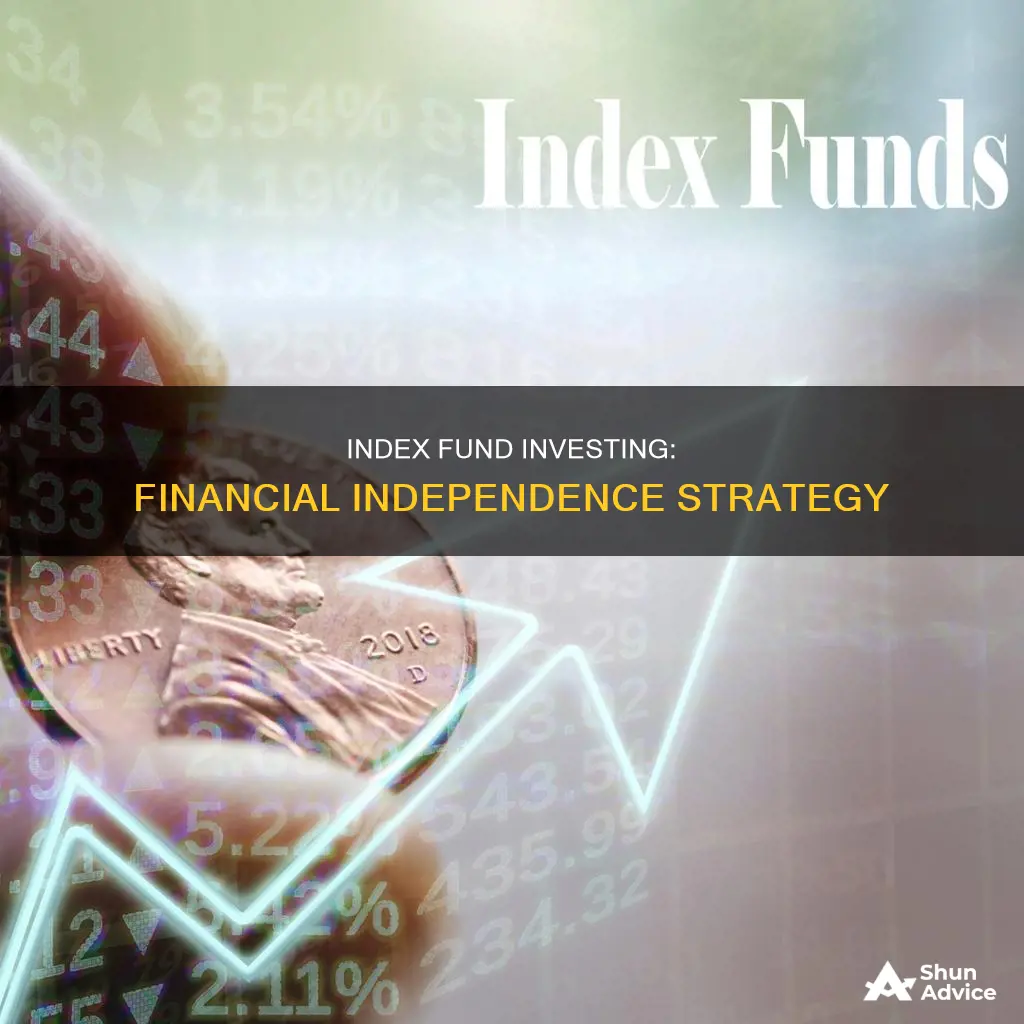
Index funds are a great way to build wealth over time and are a popular investment choice for those seeking financial independence. They are a type of mutual or exchange-traded fund (ETF) that tracks the performance of a market index, such as the S&P 500, by holding the same stocks or bonds. Index funds are passively managed, aiming to mirror the performance of the index they track without the need for active management. This makes them a low-cost investment option, as they have lower fees compared to actively managed funds.
Index funds are also a more diversified investment option, as they hold a broad range of stocks or bonds, reducing the risk of losing money. By investing in an index fund, you can own a slice of hundreds of companies across various sectors, providing a level of financial security.
To get started with index fund investing, it is important to first set clear financial goals and understand your risk tolerance. Research different index funds, considering factors such as the index they track, fees, and performance history. Choose a reputable brokerage or investment platform that offers the index fund you want to invest in, open an account, and start building your wealth.
| Characteristics | Values |
|---|---|
| Type of fund | Mutual fund or exchange-traded fund (ETF) |
| Investment strategy | Passive |
| Investment objective | To mirror the performance of a market index |
| Investment management | No active management |
| Investment costs | Low fees and expense ratios |
| Investment diversification | Broadly diversified across various sectors and asset classes |
| Investment returns | Solid long-term returns |
| Investment suitability | Suitable for long-term investing and retirement accounts |
| Investment risks | Subject to market swings |
What You'll Learn

Index funds vs. individual stocks
Index funds and individual stocks are two of the most common investment options. While both can be used to achieve financial independence, they have distinct characteristics and offer different advantages and risks.
Index funds are a type of investment fund that tracks the performance of a market index, such as the S&P 500, by holding the same stocks or bonds or a representative sample of them. These funds are passively managed, aiming to mirror the performance of the underlying index. Index funds provide broad market exposure and diversification across various sectors and asset classes, depending on the index they follow. For example, the S&P 500 index includes 500 of the top companies in the US stock market.
On the other hand, investing in individual stocks means purchasing shares of a specific publicly traded company. This gives you ownership rights, benefits such as dividends and voting privileges, and the potential for higher returns, especially if the company is growing quickly.
When comparing index funds and individual stocks, here are some key considerations:
Diversification and Risk
Index funds offer built-in diversification since they hold a basket of different stocks or assets. This diversification helps to reduce the overall risk of the investment. If one company in the index underperforms, it will have a smaller impact on the overall fund's performance. In contrast, investing in individual stocks carries a higher risk because your capital is tied to the fortunes of a single company. If that company performs poorly, it can result in significant losses.
Investment Research and Effort
With index funds, investors can rely on the fund manager to match the performance of the underlying index, requiring minimal investment research. In contrast, investing in individual stocks requires more effort and research to pick winning stocks and monitor their ongoing performance. Investors need to stay on top of market news, company updates, and develop knowledge about stock-picking strategies.
Fees and Expenses
Index funds typically have lower fees and expenses compared to actively managed funds. Since index funds passively track an index, they don't require a large staff of analysts and traders, resulting in lower management fees. In contrast, actively managed funds have higher fees to cover the costs of research, trading, and fund management.
Control and Flexibility
Investing in individual stocks gives you more control over your investment choices. You can decide which specific companies to invest in based on your own research and preferences. With index funds, you are limited to the pre-selected investments within the fund and don't have the same level of flexibility to choose individual stocks.
Historical Performance
While individual stocks can offer the potential for higher returns, index funds have historically outperformed actively managed funds, especially after accounting for fees and expenses. Over the long term, index funds tend to provide solid returns that match the performance of the overall market.
Suitability for Beginners
Index funds are generally considered more suitable for beginner investors due to their simplicity and lower costs. They provide a cost-effective way to gain exposure to a diversified portfolio of stocks or bonds. In contrast, investing in individual stocks may be more suitable for experienced investors who have the knowledge and time to research and select individual companies.
In conclusion, both index funds and individual stocks have their advantages and considerations. Index funds offer diversification, lower fees, and historical performance that matches the market. Individual stocks provide the potential for higher returns but carry more risk and require more research and effort. Ultimately, the choice between index funds and individual stocks depends on your investment goals, risk tolerance, and the amount of time and knowledge you want to devote to investing.
Raising Capital for Investment Funds: Strategies for Success
You may want to see also

The benefits of index funds
Index funds are a great investment for building wealth over the long term. They are a type of mutual or exchange-traded fund (ETF) that tracks the performance of a market index, such as the S&P 500, by holding the same stocks or bonds or a representative sample of them.
Low costs and fees
Index funds typically have lower expense ratios because they are passively managed. They are cheap to run because they are automated to follow the shifts in value in an index. According to data from the Investment Company Institute in 2024, the average fee for an index fund is 0.05%, with some index funds offering even lower expense ratios.
Market representation and broad diversification
Index funds aim to mirror the performance of a specific index, offering broad market exposure. This is ideal for those looking for a diversified investment that tracks overall market trends. By investing in an index fund, you can own a slice of every publicly traded company in an index, which provides immediate diversification.
Transparency
Since index funds replicate a market index, their holdings are well-known and available on most investing platforms. This makes it easy for investors to know exactly what they are investing in.
Historical performance
Over the long term, many index funds have outperformed actively managed funds, especially after accounting for fees and expenses. The S&P 500, for example, has posted an average annual return of nearly 10% since 1928.
Tax efficiency
Index funds generally have lower turnover rates, resulting in fewer capital gains distributions and making them more tax-efficient than actively managed funds.
Maximizing Your HSA Funds: Smart Investment Strategies
You may want to see also

How to choose an index fund
Index funds are a type of mutual or exchange-traded fund (ETF) that tracks the performance of a market index, such as the S&P 500, by holding the same stocks or bonds or a representative sample of them. They are passive investments, meaning that a portfolio manager is not actively stock-picking by buying and selling securities for the fund.
- Low fees and expense ratios: Index funds typically have lower fees and expense ratios than actively managed funds because they are passively managed. Lower fees can result in higher returns over time. For example, the Vanguard Total Stock Market ETF has an expense ratio of 0.03%, while the mutual fund version charges 0.04%.
- Diversification: Index funds offer broad market exposure and diversification across various sectors and asset classes. This helps to reduce risk and can lead to more consistent returns.
- Performance: While past performance doesn't guarantee future results, it's important to research the historical performance of the index fund and compare it to its benchmark index. Look for funds that closely track the performance of their target index.
- Transparency: Index funds are designed to replicate the performance of a specific index, so their holdings are well-known and easily accessible to investors. This transparency can help you understand the fund's investment strategy and potential risks.
- Tax efficiency: Index funds generally have lower turnover rates, resulting in fewer capital gains distributions and potentially lower taxes for investors.
- Investment platform and account type: Choose a reputable online brokerage or investment platform that offers a wide range of index funds. Consider the type of account you want to open, such as a taxable account or a tax-advantaged account like a 401(k) or IRA.
- Fund size and liquidity: Larger, more established funds tend to have lower fees and better liquidity. This can impact the ease of buying and selling the fund.
- Tracking error: This measures the divergence between the fund's value and that of the index it tracks. Look for funds with low tracking errors, as high deviations from the benchmark may indicate poor fund construction or high fees.
When choosing an index fund, it's important to consider your investment goals, risk tolerance, and time horizon. Additionally, remember that index funds are generally long-term investments, so be prepared to hold them for the long haul.
Invest Wisely: American Funds Strategies for Long-Term Growth
You may want to see also

Where to buy an index fund
Index funds can be purchased through a brokerage account or directly from an index fund provider. Examples of brokerages include Charles Schwab, Fidelity, and Vanguard. Alternatively, companies like Betterment offer fully automated index fund investing through ETFs, and robo-advisors can be used to invest in index or active funds.
When deciding where to buy your index funds, you will need to choose between a taxable brokerage account and a tax-advantaged vehicle such as an individual retirement account (IRA) or 401(k) plan. This decision will depend on your investment goals.
If you are already an investor, you should focus on low fees. Fidelity, Vanguard, and other low-fee brokerages are good options. If you are new to investing, JL Collins recommends Vanguard because its structure is unique—when someone invests in Vanguard, they become an investor and an owner.
Choosing a Fund: Key Factors for Smart Investing
You may want to see also

How to monitor your index fund
Monitoring your index fund is an important part of index fund investing. Here are some detailed instructions on how to monitor your index fund:
- Regularly Review Fund Performance: It is important to periodically review the performance of your index fund to ensure it aligns with your financial goals. Compare the fund's returns with its benchmark index and evaluate if it is meeting your expectations. If the fund consistently underperforms the index, it may be time to consider alternative investment options.
- Evaluate Expenses and Fees: Index funds are known for their low costs, so it is essential to monitor the expenses associated with your fund. Compare the expense ratios of different funds tracking the same index and consider switching to a lower-cost alternative if available. Remember that higher fees do not always translate to better performance.
- Monitor Tracking Error: Tracking error refers to the difference between the performance of your index fund and its benchmark index. While some deviation is expected, a consistently high tracking error may indicate that the fund is not effectively mirroring the index. Keep an eye on this metric to ensure your fund is providing the desired market exposure.
- Diversify Your Index Fund Investments: To reduce risk, consider diversifying your index fund investments across different market sectors and asset classes. By investing in multiple index funds, you can gain exposure to a broader range of stocks or bonds. This diversification can help spread risk and potentially improve your overall investment performance.
- Consider Professional Advice: If you are unsure about monitoring your index fund or need more advanced guidance, consider consulting a financial advisor. They can provide personalized advice based on your financial situation, goals, and risk tolerance. Professional advice can be especially beneficial if you have a complex financial situation or need help constructing a diversified portfolio of index funds.
Remember, index fund investing is typically a long-term strategy, and short-term market fluctuations are expected. Focus on the long-term performance and adjust your investments as necessary to stay aligned with your financial goals.
How Do Funds Benefit from Investing in CDs?
You may want to see also
Frequently asked questions
An index fund is a type of investment fund that tracks the performance of a market index, such as the S&P 500, by holding the same stocks or bonds, or a representative sample of them. Index funds are passively managed, meaning they aim to mirror the performance of the index without actively picking securities or timing the market.
Index funds offer broad market exposure and diversification across various sectors and asset classes. They tend to have lower fees than actively managed funds and have historically outperformed them over the long term. Index funds are also considered less risky than individual stocks due to their inherent diversification.
To get started with index fund investing, you should first choose an online brokerage or investment platform that offers strong customer support and research tools. Once you've opened and funded your account, research different index funds to understand their performance history, management fees, and the indexes they track. Consider diversifying your portfolio by investing in multiple index funds. Finally, purchase shares of your chosen fund directly through the platform or app.
Some popular index funds include the Vanguard S&P 500 ETF, SPDR S&P 500 ETF Trust, iShares Core S&P 500 ETF, and Fidelity ZERO Large Cap Index. These funds track broad market indexes and have relatively low expense ratios.
Index fund investing offers a relatively low-risk and hands-off strategy to build wealth over time. By investing in a diversified portfolio of index funds, you can benefit from compound interest and potentially double or triple your savings. Index funds are also simple to invest in and typically have low management fees, making them accessible to beginner investors.







